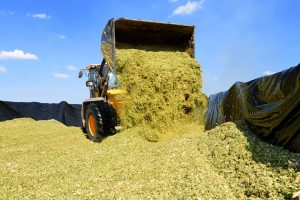ALMOST half of UK farmers are planning to pursue diversified income streams to support their agricultural businesses, according to new research from leading rural insurer NFU Mutual.
With changes to Government support and the way Britain trades with the rest of the world ahead, farmers are diversifying their businesses to boost profitability and fortify their farms for the future.
Forty-eight per cent of farmers are planning to set up or expand diversification businesses following Brexit, moving into new areas such as tourism, hospitality, retail and renewable energy.
This figure has doubled since NFU Mutual carried out similar research in 2018 and found 23 per cent of farmers were planning to expand or start diversification enterprises.
The sharp increase in diversification comes as agriculture undergoes the biggest change to funding in decades following the UK’s exit from the European Union.
In a report published on Friday (Feb 7) NFU Mutual provides advice on setting up new diversification businesses and looks at case studies of successful schemes from wedding venues and glamping to kefir dairy products and cosmetics.
“The next seven years will be crucial for the farming industry,” explained Chris Walsh, NFU Mutual’s Farm Specialist. “Because of this, many farmers are looking at new business opportunities to spread their risk.
“Farmers have always had to adapt to changing times, and a number have been diversifying for decades. But even more are now deciding to support their agricultural work with new ideas.
“Whether it’s building holiday cottages, launching a wedding venue, or opening a farm shop, not only can these new businesses supplement the existing farm, they often provide other members of the family with a crucial role in the business.
“Our research shows nearly half of UK farmers are either looking into setting up new businesses on their land or expanding existing diversification ideas, with a quarter planning to diversify to create business opportunities for family members.
“There is only room for a certain number of farm shops, holiday cottages and wedding venues so farmers planning to diversify need to do careful research and costings before they start converting cow sheds into cafes.
“Farmers and their families also need to have the right skills – particularly if they’re going to be working with the public. It’s a big change looking after a demanding wedding party if you’re used to being on a hillside with a flock of sheep all day.”
The report stresses the importance of detailed planning to minimise risks to the public and employees and make insurance of new diversification schemes straightforward. It also highlights the importance of looking at the financial implications of setting up non-farming activities to avoid higher Inheritance Tax Bills.
Looking ahead, the report suggests there may be new opportunities for farmers to access Government financial support for diversification schemes as changes to agricultural support are rolled out.
DEFRA statistics show that diversification activity brought in £740m of income in 2018/19 – up 6% on the previous year.
NFU Mutual’s report, together with a series of videos and podcasts produced to help farmers considering diversification, is now available to download at nfumutual.co.uk/diversification
NFU MUTUAL DIVERSIFICATION ADVICE
Diversification means using your farm’s assets, such as its land, buildings or machinery to develop a new business activity. Diversification ventures usually set out to provide additional revenue and can complement the agricultural activity or may even, over time, replace it.
Before you start, consider:
• Do you have the skills, resources and commitment to make it work or would it be a distraction from the core farm business?
• Have you fully reviewed your farm business and identified strengths and areas where you can add value to your existing model?
• What are your assets – from people, land, location, buildings, finance to skills – and have you realised their full potential?
• What market and demand is there for your diversification venture?
• What makes your farm unique and sets you apart from the competition?
• Have you asked the experts for advice? For example, speak to insurers at the planning stage to ensure you understand the risks and have the right level of cover to meet your needs.
DIVERSIFICATION TOUGHER IN WALES
Farming businesses in Wales face many hurdles, such as poor upland land quality, and remoteness from centres of population. These factors severely restrict business resilience and diversification.
Improving farm efficiency, developing non-food and non-crop revenues, participation in agri-environmental schemes, or access to rural development funding and business support, are more difficult in Wales than elsewhere.
When compared with England, Welsh farms are also smaller and less well resourced and receive an average of £3,300 less in funding.
Although diversification on Welsh farms has grown over the past decade, diversification revenues on Welsh farms represented on average only 3.4% of total farm revenues in 2017, compared to an average of 7.7% in England.
That suggests reliance on increased farm diversification to build resilience in Wales remains an optimistic strategy. In the worst-case post-Brexit scenario diversification revenues might need to increase up to tenfold to replace other lost revenues.
Farms in Wales depend on income streams separate from the main farming business.
A range of actions might support the continued growth in diversified income. However, although they could help deliver wider social and environmental public goods, they might not support farming, community identity or build economically sustainable farm businesses.
Welsh Government policy might want to pull in one direction but reality suggests that its goals will be far harder to achieve than sunny optimism and glib soundbites suggest.
Farm diversification more difficult in Wales














